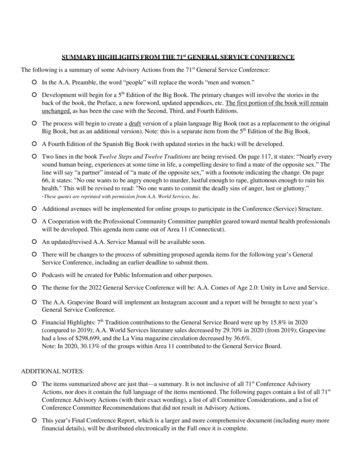
Transcription
SuetoniusThe Twelve Caesars
Translation 2010 A. S. Kline, All Rights ReservedThis work MAY be FREELY reproduced, stored and transmitted, electronically or otherwise, forany NON-COMMERCIAL purpose.
ContentsTranslator’s NoteBook One: Julius Caesar (later deified)Book One: I Early LifeBook One: II First CampaignBook One: III Return to RomeBook One: IV The Dolabella Trial, Rhodes and AsiaBook One: V Military Tribune in RomeBook One: VI Family EulogiesBook One: VII His DestinyBook One: VIII The Italian ColoniesBook One: IX ConspiracyBook One: X Wooing the MassesBook One: XI Political In-fightingBook One: XII The Trial of Gaius RabiriusBook One: XIII Pontifex MaximusBook One: XIV The Catiline ConspiracyBook One: XV PraetorBook One: XVI Support from the CommonsBook One: XVII Accusations of Complicity in the Catiline ConspiracyBook One: XVIII Further SpainBook One: XIX Consulship: Strategic AlliancesBook One: XX The ‘Consulship of Julius and Caesar’Book One: XXI Alliance with PompeyBook One: XXII Governor of GaulBook One: XXIII Threat of ImpeachmentBook One: XXIV Power Base in GaulBook One: XXV Campaigns in Britain and Beyond the RhineBook One: XXVI Mounting AmbitionBook One: XXVII Buying FavourBook One: XXVIII Opposition from Marcus Claudius MarcellusBook One: XXIX An Appeal to the SenateBook One: XXX The Eve of Civil WarBook One: XXXI Advance to the RubiconBook One: XXXII The Die is CastBook One: XXXIII Exhorting the TroopsBook One: XXXIV Victory in SpainBook One: XXXV In Pursuit of Pompey
Book One: XXXVI Victory despite Set-backsBook One: XXXVII His TriumphsBook One: XXXVIII His Gifts to the Soldiers and PeopleBook One: XXXIX His Public EntertainmentsBook One: XL His Reform of the CalendarBook One: XLI His Reform of the Administration and Electoral SystemBook One: XLII Other ReformsBook One: XLIII His Administration of JusticeBook One: XLIV His Civil ProjectsBook One: XLV His Appearance and DressBook One: XLVI His ResidencesBook One: XLVII His AcquisitivenessBook One: XLVIII His Household ManagementBook One: XLIX His Relationship with King NicomedesBook One: L His Affairs with Roman WomenBook One: LI His Reputation ElsewhereBook One: LII His Royal Love AffairsBook One: LIII His Food And DrinkBook One: LIV His CupidityBook One: LV His OratoryBook One: LVI His WritingsBook One: LVII His Physical Skills and Powers of EnduranceBook One: LVIII His Sound Judgement on CampaignBook One: LIX His Lack of SuperstitionBook One: LX His Battle TacticsBook One: LXI His HorseBook One: LXII His Rallying of the TroopsBook One: LXIII His Self-Possession after PharsalusBook One: LXIV His Self-Possession at AlexandriaBook One: LXV His Handling of the TroopsBook One: LXVI His Exhortations to the ArmyBook One: LXVII His IndulgenceBook One: LXVIII His Troops Loyalty and CourageBook One: LXIX His Reaction to Mutiny at PlacentiaBook One: LXX His Handling of the Tenth Legion at RomeBook One: LXXI His Devotion to his DependentsBook One: LXXII His Kindness to his FriendsBook One: LXXIII His Reconciliation with Ex-OpponentsBook One: LXXIV His ClemencyBook One: LXXV His Acts of Mercy in Warfare
Book One: LXXVI His Abuse of PowerBook One: LXXVII His Public ArroganceBook One: LXXVIII The Defining MomentBook One: LXXIX Caesar and the KingshipBook One: LXXX The ConspiracyBook One: LXXXI Warnings and PortentsBook One: LXXXII The AssassinationBook One: LXXXIII The WillBook One: LXXXIV The FuneralBook One: LXXXV The Aftermath of the FuneralBook One: LXXXVI His Anticipation of DeathBook One: LXXXVII His Wish for a Swift EndBook One: LXXXVIII The CometBook One: LXXXIX The Fate of the ConspiratorsBook Two: Augustus (later deified)Book Two: I The OctaviiBook Two: II His Paternal AncestorsBook Two: III His FatherBook Two: IV His Maternal AncestorsBook Two: V His BirthBook Two: VI His NurseryBook Two: VII His Various NamesBook Two: VIII A Brief Summary of His LifeBook Two: IX His Involvement in Civil WarBook Two: X MutinaBook Two: XI Claims Against Him of TreacheryBook Two: XII His Desertion of the Senatorial PartyBook Two: XIII PhilippiBook Two: XIV PerusiaBook Two: XV The Aftermath of PerusiaBook Two: XVI SicilyBook Two: XVII His Victory over Antony and CleopatraBook Two: XVIII The Tomb of Alexander the GreatBook Two: XIX Rebellions and ConspiraciesBook Two: XX His Imperial CampaigningBook Two: XXI His Consolidation of EmpireBook Two: XXII Peace and TriumphsBook Two: XXIII The Defeats of Lollius and VarusBook Two: XXIV His Use of DisciplineBook Two: XXV His Soldiers
Book Two: XXVI His ConsulshipsBook Two: XXVII Triumvir, Tribune, CensorBook Two: XXVIII Sole RulerBook Two: XXIX Public WorksBook Two: XXX Civic ImprovementsBook Two: XXXI Religious Reforms and MemorialsBook Two: XXXII Security and Legal ReformsBook Two: XXXIII His Administration of JusticeBook Two: XXXIV Revision of the LawsBook Two: XXXV Reform of the SenateBook Two: XXXVI Reform of the AdministrationBook Two: XXXVII Extensions to Public OfficeBook Two: XXXVIII Maintenance of Military CapabilityBook Two: XXXIX Examination of the KnightsBook Two: XL Electoral and Citizenship ReformBook Two: XLI His Financial GenerosityBook Two: XLII His Disregard for PopularityBook Two: XLIII His Public EntertainmentsBook Two: XLIV His Regulation of SpectatorsBook Two: XLV His Presence at the GamesBook Two: XLVI His Encouragement of Population IncreaseBook Two: XLVII His Administration of the ProvincesBook Two: XLVIII His Control of Defeated KingdomsBook Two: XLIX His Military DispositionsBook Two: L His Personal SealBook Two: LI His Clemency and ModerationBook Two: LII His Refusal of HonoursBook Two: LIII His Public MannerBook Two: LIV His Tolerance of Free-SpeechBook Two: LV His Tolerance of LibelBook Two: LVI His Respect for Established Law and CustomBook Two: LVII Public Marks of AffectionBook Two: LVIII Father of the CountryBook Two: LIX Offerings and CommemorationsBook Two: LX Tributes from the KingdomsBook Two: LXI Domestic and Private Life: His Mother and SisterBook Two: LXII His MarriagesBook Two: LXIII His Daughter JuliaBook Two: LXIV His GrandchildrenBook Two: LXV Deaths and Scandal
Book Two: LXVI His FriendshipsBook Two: LXVII His Slaves and FreedmenBook Two: LXVIII Accusations of Homosexuality and EffeminacyBook Two: LXIX His AdulteriesBook Two: LXX His Other VicesBook Two: LXXI His ReputationBook Two: LXXII His Moderate LifestyleBook Two: LXXIII His Simple Clothes and FurnishingsBook Two: LXXIV His Dinner PartiesBook Two: LXXV His Sense of HumourBook Two: LXXVI His FoodBook Two: LXXVII His DrinkBook Two: LXXVIII His Sleeping HabitsBook Two: LXXIX His AppearanceBook Two: LXXX His Physical Blemishes and WeaknessesBook Two: LXXXI His Major IllnessesBook Two: LXXXII His Care of His HealthBook Two: LXXXIII His Exercise and DiversionsBook Two: LXXXIV His OratoryBook Two: LXXXV His WritingsBook Two: LXXXVI His Style of SpeechBook Two: LXXXVII His Favourite Words and PhrasesBook Two: LXXXVIII His Orthography and Cipher KeyBook Two: LXXXIX His Interest in LiteratureBook Two: XC His Superstition Regarding LightningBook Two: XCI His Attitude to DreamsBook Two: XCII His Regard for Certain OmensBook Two: XCIII His Respect for Certain Foreign ReligionsBook Two: XCIV Omens of DestinyBook Two: XCV Omens of Imminent PowerBook Two: XCVI Omens of Victory in WarBook Two: XCVII Omens of DeathBook Two: XCVIII His Last DaysBook Two: XCIX His DeathBook Two: C His FuneralBook Two: CI His WillBook Three: TiberiusBook Three: I The ClaudiiBook Three: II Good and BadBook Three: III The Livii
Book Three: IV His FatherBook Three: V BirthBook Three: VI Childhood and BoyhoodBook Three: VII Marriage and Family MattersBook Three: VIII His Civil CareerBook Three: IX His Military and Official AppointmentsBook Three: X Withdrawal from RomeBook Three: XI Retirement at RhodesBook Three: XII Under SuspicionBook Three: XIII Recall to RomeBook Three: XIV Omens of DestinyBook Three: XV Adoption by AugustusBook Three: XVI Campaigning in IllyricumBook Three: XVII Recognition in RomeBook Three: XVIII Return to GermanyBook Three: XIX Discipline and CautionBook Three: XX Triumphant Return to RomeBook Three: XXI The SuccessionBook Three: XXII The Death of PostumusBook Three: XXIII The Reading of Augustus’ WillBook Three: XXIV His AccessionBook Three: XXV Mutiny and ConspiracyBook Three: XXVI His Political DiscretionBook Three: XXVII His Dislike of FlatteryBook Three: XXVIII His Support of Free SpeechBook Three: XXIX His CourtesyBook Three: XXX His Support of the SenateBook Three: XXXI His Support of the Consuls and the Rule of LawBook Three: XXXII His Modesty and Respect for TraditionBook Three: XXXIII His Regulation of AbusesBook Three: XXXIV His Cost and Price ControlsBook Three: XXXV His Strictures Regarding Marriage and RankBook Three: XXXVI The Banning of Foreign Rites and SuperstitionsBook Three: XXXVII His Suppression of LawlessnessBook Three: XXXVIII His Dislike of TravelBook Three: XXXIX His Withdrawal to CampaniaBook Three: XL His Crossing to CapreaeBook Three: XLI His Final Retirement to CapreaeBook Three: XLII His Moral DeclineBook Three: XLIII His Licentiousness on Capri
Book Three: XLIV His Gross DepravitiesBook Three: XLV His Abuse of WomenBook Three: XLVI His FrugalityBook Three: XLVII His Lack of Public GenerosityBook Three: XLVIII Rare ExceptionsBook Three: XLIX His RapacityBook Three: L His Hatred of his KinBook Three: LI His Later Enmity Towards LiviaBook Three: LII His Lack of Affection for Drusus the Younger and GermanicusBook Three: LIII His Treatment of Agrippina the ElderBook Three: LIV His Treatment of His Grandsons Nero and DrususBook Three: LV His Treatment of His AdvisorsBook Three: LVI His Treatment of His Greek CompanionsBook Three: LVII His Inherent CrueltyBook Three: LVIII His Abuse of Lese-MajestyBook Three: LIX Satires Directed Against HimBook Three: LX His Cruelty on CapreaeBook Three: LXI The Increasing Cruelty of His ReignBook Three: LXII The Effects of Drusus the Younger’s DeathBook Three: LXIII His InsecurityBook Three: LXIV His Treatment of Agrippina and Her SonsBook Three: LXV The Downfall of SejanusBook Three: LXVI Public CriticismBook Three: LXVII His Ultimate Self-DisgustBook Three: LXVIII His Appearance and MannerismsBook Three: LXIX His Fear of ThunderBook Three: LXX His Literary InterestsBook Three: LXXI His Use of Latin for Public BusinessBook Three: LXXII His Two Attempts to Re-Visit RomeBook Three: LXXIII His DeathBook Three: LXXIV Portents of his DeathBook Three: LXXV Public Response to his DeathBook Three: LXXVI His WillBook Four: Gaius CaligulaBook Four: I His Father, GermanicusBook Four: II Piso Suspected of Germanicus’s DeathBook Four: III The Character of GermanicusBook Four: IV Germanicus’s PopularityBook Four: V The Grief at Germanicus’s DeathBook Four: VI Prolonged Mourning for Germanicus
Book Four: VII Germanicus’s ChildrenBook Four: VIII The Birth of Gaius (Caligula)Book Four: IX The Army’s Devotion to HimBook Four: X His Childhood and YouthBook Four: XI His Cruel NatureBook Four: XII ParricideBook Four: XIII His Joyous Reception by the Roman PeopleBook Four: XIV His Accession to PowerBook Four: XV His Filial Piety and Moratorium on Past ChargesBook Four: XVI His Other Inaugural ActionsBook Four: XVII His ConsulshipsBook Four: XVIII His Public Entertainments in RomeBook Four: XIX His Bridge at BaiaeBook Four: XX His Entertainments in the ProvincesBook Four: XXI His Public WorksBook Four: XXII His Pretensions to DivinityBook Four: XXIII His Treatment of his RelativesBook Four: XXIV His Incest With and Prostitution of his SistersBook Four: XXV His MarriagesBook Four: XXVI His Cruel Treatment of OthersBook Four: XXVII His Savage NatureBook Four: XXVIII His Murder of ExilesBook Four: XXIX His Morbid WitBook Four: XXX Oderint, Dum MetuantBook Four: XXXI His Desire for DisastersBook Four: XXXII His More Casual CrueltiesBook Four: XXXIII His Cynical HumourBook Four: XXXIV His Hatred of Famous MenBook Four: XXXV His Envy of OthersBook Four: XXXVI His Sexual ImmoralityBook Four: XXXVII His ExtravaganceBook Four: XXXVIII His Plunder and ExtortionBook Four: XXXIX His Auctions in GaulBook Four: XL His New Methods of TaxationBook Four: XLI His Other Nefarious Methods of Raising MoneyBook Four: XLII His Daughter’s DowryBook Four: XLIII His Expedition to GermanyBook Four: XLIV The Surrender of a British PrinceBook Four: XLV Mock WarfareBook Four: XLVI Victory Over the Sea
Book Four: XLVII Preparations for a TriumphBook Four: XLVIII An Attempt Against the LegionsBook Four: XLIX His Intentions Towards the SenateBook Four: L His Appearance and HealthBook Four: LI His Over-Confidence and FearsBook Four: LII His Mode of DressBook Four: LIII His OratoryBook Four: LIV His Gladiatorial and Theatrical SkillsBook Four: LV His FavouritesBook Four: LVI The Conspiracies Against HimBook Four: LVII Portents of His AssassinationBook Four: LVIII His DeathBook Four: LIX His CremationBook Four: LX Confusion ReignsBook Five: Claudius (later deified)Book Five: I His Father, Drusus the ElderBook Five: II His Birth and ChildhoodBook Five: III Uncertainty as to his AbilitiesBook Five: IV Augustus’s Opinions of Young ClaudiusBook Five: V His Obscurity under TiberiusBook Five: VI Minor Honours under TiberiusBook Five: VII Promotion under CaligulaBook Five: VIII Mocked by the CourtBook Five: IX Exposure to DangerBook Five: X Accession to PowerBook Five: XI His Immediate ActionsBook Five: XII His Modesty and RestraintBook Five: XIII Acts of Treachery against HimBook Five: XIV His ConsulshipsBook Five: XV His Inconsistencies as JudgeBook Five: XVI His CensorshipBook Five: XVII His Campaign in BritainBook Five: XVIII The Grain SupplyBook Five: XIX His Incentives to Ship-OwnersBook Five: XX His Public WorksBook Five: XXI His Public EntertainmentsBook Five: XXII His Attention to Religious ProcedureBook Five: XXIII His Attention to the LawBook Five: XXIV His Attention to Rank and StatusBook Five: XXV The Influence of His Wives and Freedmen
Book Five: XXVI His MarriagesBook Five: XXVII His ChildrenBook Five: XXVIII His FreedmenBook Five: XXIX His MalleabilityBook Five: XXX His Appearance and MannerismsBook Five: XXXI His General HealthBook Five: XXXII His BanquetsBook Five: XXXIII His HabitsBook Five: XXXIV His Cruel NatureBook Five: XXXV His Timidity and InsecurityBook Five: XXXVI His Fear of ConspiracyBook Five: XXXVII The Fall of SilanusBook Five: XXXVIII His Self-AwarenessBook Five: XXXIX His Mental AbstractionBook Five: XL His Inappropriate RemarksBook Five: XLI His Literary WorksBook Five: XLII His Greek StudiesBook Five: XLIII His Regret at Adopting NeroBook Five: XLIV His DeathBook Five: XLV The AftermathBook Five: XLVI Omens of his DeathBook Six: NeroBook Six: I The Domitian FamilyBook Six: II Nero’s AncestorsBook Six: III Nero’s Great-GrandfatherBook Six: IV Nero’s GrandfatherBook Six: V Nero’s FatherBook Six: VI Nero’s Birth and InfancyBook Six: VII His Boyhood and YouthBook Six: VIII His Accession to PowerBook Six: IX His Display of Filial PietyBook Six: X His Initial Benevolent IntentionsBook Six: XI Chariot Races and TheatricalsBook Six: XII Shows and ContestsBook Six: XIV His First Four ConsulshipsBook Six: XV His Administration of AffairsBook Six: XVI His Public Works and LegislationBook Six: XVII Actions to Combat Forgery and CorruptionBook Six: XVIII His Lack of Imperial AmbitionBook Six: XIX His Planned Foreign Tours and Expedition
Book Six: XX His Musical Education and Debut in NaplesBook Six: XXI His Debut in RomeBook Six: XXII Chariot-Racing and the Trip to GreeceBook Six: XXIII His Anxiety When CompetingBook Six: XXIV His Behaviour in CompetitionBook Six: XXV Return from GreeceBook Six: XXVI His Evil NatureBook Six: XXVII His Increasing WickednessBook Six: XXVIII His Sexual DebaucheryBook Six: XXIX His Erotic PracticesBook Six: XXX His ExtravaganceBook Six: XXXI Public Works and the Golden HouseBook Six: XXXII His Methods of Raising MoneyBook Six: XXXIII His Murder of Claudius and BritannicusBook Six: XXXIV His Murder of his Mother and AuntBook Six: XXXV More Family MurdersBook Six: XXXVI The Pisonian ConspiracyBook Six: XXXVII Indiscriminate PersecutionBook Six: XXXVIII The Great Fire of RomeBook Six: XXXIX Disasters and AbuseBook Six: XL Uprising in GaulBook Six: XLI Continuing RebellionBook Six: XLII Galba’s InsurrectionBook Six: XLIII Nero’s Reaction to the Gallic RebellionBook Six: XLIV His Preparations for a CampaignBook Six: XLV Popular ResentmentBook Six: XLVI Dreams and OmensBook Six: XLVII Preparations for FlightBook Six: XLVIII A Last Hiding-PlaceBook Six: XLIX His DeathBook Six: L His FuneralBook Six: LI His Appearance, Health and Mode of DressBook Six: LII His Knowledge of the ArtsBook Six: LIII His Desire for PopularityBook Six: LIV His Last Vow to Perform as Actor and MusicianBook Six: LV His Desire for Fame and ImmortalityBook Six: LVI His Superstitious BeliefsBook Six: LVII Conflicting Emotions after his DeathBook Seven: GalbaBook Seven: I The End of the Caesars
Book Seven: II Galba’s LineageBook Seven: III His AncestorsBook Seven: IV Birth and DestinyBook Seven: V Marriage and Other RelationshipsBook Seven: VI His Career during Caligula’s ReignBook Seven: VII His Career during Claudius’s ReignBook Seven: VIII Appointment to Office under NeroBook Seven: IX Governorship of his Spanish ProvinceBook Seven: X Leader of the Rebellion in SpainBook Seven: XI The March to RomeBook Seven: XII His Cruelty and GreedBook Seven: XIII His Lack of PopularityBook Seven: XIV The Influence of his ‘Tutors’Book Seven: XV Restrictions and FavouritismBook Seven: XVI Mutiny in Upper GermanyBook Seven: XVII Naming a SuccessorBook Seven: XVIII Omens of His DemiseBook Seven: XIX His DeathBook Seven: XX The AftermathBook Seven: XXI His Personal AppearanceBook Seven: XXII His Personal HabitsBook Seven: XXIII Reaction to his DeathBook Seven: OthoBook Seven: XXIV (I) Otho’s AncestryBook Seven: XXV (II) Friend to NeroBook Seven: XXVI (III) Governor of LusitaniaBook Seven: XXVII (IV) Hopes of AccessionBook Seven: XXVIII (V) Preparation for a CoupBook Seven: XXIX (VI) Seizing PowerBook Seven: XXX (VII) Exercising CommandBook Seven: XXXI (VIII) Civil War against VitelliusBook Seven: XXXII (IX) Military DefeatBook Seven: XXXIII (X) Preparations for SuicideBook Seven: XXXIV (XI) His DeathBook Seven: XXXV (XII) Appearance, Habits, Reaction to his DeathBook Seven: VitelliusBook Seven: XXXVI (I) The VitelliBook Seven: XXXVII (II) Immediate AncestorsBook Seven: XXXVIII (III) Birth, Childhood, YouthBook Seven: XXXIX (IV) A Favourite of Three Emperors
Book Seven: XL (V) High OfficeBook Seven: XLI (VI) His MarriagesBook Seven: XLII (VII) Posting to Lower GermanyBook Seven: XLIII (VIII) Support from the ArmyBook Seven: XLIV (IX) Omens of WeaknessBook Seven: XLV (X) Victory at BetriacumBook Seven: XLVI (XI) His AccessionBook Seven: XLVII (XII) His FavouritesBook Seven: XLVIII (XIII) His GluttonyBook Seven: XLIX (XIV) His CrueltyBook Seven: L (XV) The Flavian RevoltBook Seven: LI (XVI) Refuge in the PalaceBook Seven: LII (XVII) His DeathBook Seven: LIII (XVIII) The Omen FulfilledBook Eight: Vespasian (later deified)Book Eight: I The FlaviansBook Eight: II Early LifeBook Eight: III MarriageBook Eight: IV Military Career and GovernorshipsBook Eight: V Omens and PropheciesBook Eight: VI Support from the ArmyBook Eight: VII Miraculous Events in EgyptBook Eight: VIII Strengthening the StateBook Eight: IX Public WorksBook Eight: X Outstanding LawsuitsBook Eight: XI Civil ReformBook Eight: XII His ModestyBook Eight: XIII His ToleranceBook Eight: XIV His Lack of ResentmentBook Eight: XV His ClemencyBook Eight: XVI His CupidityBook Eight: XVII His GenerosityBook Eight: XVIII His Encouragement of the Arts and SciencesBook Eight: XIX His Support for the TheatreBook Eight: XX His Appearance and HealthBook Eight: XXI His Daily RoutineBook Eight: XXII His Wit and HumourBook Eight: XXIII Quotations and JestsBook Eight: XXIV His DeathBook Eight: XXV The Flavian Dynasty
Book Eight: Titus (later deified)Book Eight: XXVI (I) Titus’s BirthBook Eight: XXVII (II) Friendship with BritannicusBook Eight: XXVIII (III) His Appearance and TalentsBook Eight: XXIX (IV) Military Service and MarriageBook Eight: XXX (V) The Conquest of JudaeaBook Eight: XXXI (VI) Co-RulerBook Eight: XXXII (VII) His Poor Reputation versus the RealityBook Eight: XXXIII (VIII) His Public BenevolenceBook Eight: XXXIV (IX) His ClemencyBook Eight: XXXV (X) His Last IllnessBook Eight: XXXVI (XI) His DeathBook Eight: DomitianBook Eight: XXXVII (I) Domitian’s Early LifeBook Eight: XXXVIII (II) Public Office and the SuccessionBook Eight: XXXIX (III) His InconsistencyBook Eight: XL (IV) His Public EntertainmentsBook Eight: XLI (V) His Public WorksBook Eight: XLII (VI) His CampaignsBook Eight: XLIII (VII) His Social ReformsBook Eight: XLIV (VIII) His Administration of JusticeBook Eight: XLV (IX) His Initial ModerationBook Eight: XLVI (X) His DegenerationBook Eight: XLVII (XI) His CrueltyBook Eight: XLVIII (XII) His AvariceBook Eight: XLIX (XIII) His Arrogance and PresumptionBook Eight: L (XIV) Hated and AfraidBook Eight: LI (XV) Premonitions of DeathBook Eight: LII (XVI) The Eve of AssassinationBook Eight: LIII (XVII) His DeathBook Eight: LIV (XVIII) His AppearanceBook Eight: LV (XIX) His Lack of ExerciseBook Eight: LVI (XX) His Neglect of LiteratureBook Eight: LVII (XXI) His Daily HabitsBook Eight: LVIII (XXII) His Sexual AppetiteBook Eight: LIX (XXIII) The Aftermath of his DeathIndex
Translator’s Note: The introductory paragraphs to the life of Julius Caesar are lost in allmanuscripts. The dates and notes in brackets throughout are my insertions, to allow the reader tofollow the chronology without using footnotes. Names have been expanded in places to assistidentification. Information in the index entries frequently extends that given by Suetonius in thetext without however attributing sources. Wikipedia and other internet sites will provide goodadditional information for those seeking deeper knowledge.
Book One: Julius Caesar (later deified)Book One: I Early LifeWhen Julius Caesar was aged fifteen, his father died (85/84BC). During the next consulship,having previously been nominated to the priesthood of Jupiter (in 86BC, by Marius and Cinna theconsuls) he broke off his engagement to Cossutia, a rich girl though of only equestrian rank, towhom he had been betrothed while still a boy and before he had assumed the purple-bordered togapraetexta, and married the daughter of Lucius Cornelius Cinna who had been four times consul(87-84BC). This Cornelia later bore him a daughter, Julia.He resisted all attempts by Sulla, the dictator, to make him divorce her. So that, as well aslosing the priesthood, his wife’s dowry, and his own inheritance, he was treated as a member ofthe opposition, and was forced into hiding. Though suffering from a virulent bout of quartan fever,he had to find a new hide-out almost every night, and he saved himself from Sulla’s spies bybribery. Finally, through the intercession of the Vestal Virgins, and his near relatives MamercusAemilius and Aurelius Cotta, he won pardon. It is known that after firmly resisting the pleas ofCaesar’s most devoted and eminent friends, who were obstinate in his cause, Sulla finally gaveway and, divinely inspired or with shrewd foresight, cried: ‘You win then, take him! But be clear,the man you’re so keen to save will prove the ruin, some day, of this party you and I support; thereis many a Marius in this fellow, Caesar.’Book One: II First CampaignHis first military campaign was in Asia (81BC), as an aide-de-camp to Marcus Minucius Thermus,the governor of the province. Sent to Bithynia by Thermus, to raise a fleet, he idled so long at thecourt of King Nicomedes it was rumoured he had prostituted himself to the king. He exacerbatedthe rumour by travelling back to Bithynia, a few days after his return, ostensibly to collect a debtowed to a freedman, one of his followers. However his reputation improved later in the campaignand, at the storming of Mytilene (80BC), Thermus awarded him a civic crown of oak leaves forsaving a fellow-campaigner’s life.Book One: III Return to RomeHe also campaigned in Cilicia, under Servilius Isauricus. Not for long though, for hearing ofSulla’s death (78BC), and hoping to benefit from a revolt led by Marcus Lepidus, he hastenedswiftly back to Rome. Though he was made highly attractive offers, he chose not to align himselfwith Lepidus, lacking confidence in the man’s abilities, and in the situation which now seemedless promising.
Book One: IV The Dolabella Trial, Rhodes and AsiaThe civil unrest was quelled, and subsequently Caesar brought an extortion case (77BC) againstCornelius Dolabella, an ex-consul who had once been afforded a triumph. On Dolabella’sacquittal, Caesar decided to withdraw to Rhodes both to escape the resultant ill-feeling and to restand have leisure to study oratory under Apollonius Molon, the pre-eminent teacher of rhetoric atthat time.During the crossing to Rhodes, at the start of winter, he was captured by pirates (75BC) offthe island of Pharmacussa and, to his intense aggravation, remained their prisoner for almost fortydays, attended only by a physician and two man-servants, since on being taken he had sent the restof his friends and staff to raise money for a ransom. Set on shore, after fifty talents had been paid,he lost no time in raising a fleet, hunting the fleeing pirates down and, as soon as they were in hispower, executing on them the punishment of crucifixion with which he had often smilinglythreatened them.He sailed on to Rhodes (74BC), but then, so as not to remain idle while allies appeared to bein danger, he crossed to Asia Minor where Mithridates was ravaging the neighbouring region. Heraised a band of auxiliaries there, and drove Mithridates’ deputy from the province, so maintainingthe allegiance of its faltering and irresolute cities.Book One: V Military Tribune in RomeAppointed to his first office as military tribune, by popular vote, after his return to Rome, Caesargave strong support to the assembly leaders in restoring the tribunes’ powers, diminished bySulla’s dictatorship (70BC). He also spoke in favour of the bill introduced by Plotius whichbrought about the recall from exile of his brother-in-law Lucius Cornelius Cinna, and the othermembers of Lepidus’ civil insurgency, who had fled to Spain and joined Sertorius after Lepidus’death in 77BC.Book One: VI Family EulogiesAs quaestor (69BC) Caesar gave the traditional funeral orations from the Rostra at the deaths of hisaunt Julia, and his wife Cornelia. In the eulogy for his aunt he spoke the following wordsconcerning her ancestry and that of the Caesars: ‘My paternal aunt Julia was descended on hermother’s side from royalty, since the Marcii Reges were founded by the Roman King AncusMarcius; and on her father’s side from the immortal gods, since the Julians, of whom we Caesarsare a branch, are descended from the goddess Venus herself. Our family therefore claims thesanctity of kings, who reign supreme among mortals, and the reverence owed the gods, in whosepower are those kings themselves’.Cornelia’s place was assumed by Pompeia, the daughter of Quintus Pompeius Rufus, andgrand-daughter of Lucius Sulla, though Caesar later divorced her (62BC) on suspicion of her
adultery with Publius Clodius Pulcher who, according to rumour, dressed as a woman and seducedher during a public ceremony, the Festival of Bona Dea, the Good Goddess. This rumour was sopersistent that the Senate ordered a judicial inquiry into the alleged pollution of the sacred rites.Book One: VII His DestinyAs quaestor he was appointed to Further Spain where, while conducting a round of assizes at theinstigation of the praetor, he reached Gades, and saw there the statue of Alexander the Great in thetemple of Hercules. He sighed deeply, and as if frustrated by his own lack of achievement infailing to perform anything worthy of note, at an age when Alexander had already subjugated theworld, he immediately sought his discharge, to seize the first opening for greater action in Rome.Moreover on the following night, shocked by a dream of raping his mother, he was neverthelessencouraged by the soothsayers whose interpretation filled him with the highest of hopes, that themother he had conquered was no other than Earth itself, who is deemed to be our universal parent.Book One: VIII The Italian ColoniesHe left therefore, before the end of his term, for the Latin colonies beyond the River Po, whichwere in a state of unrest, and demanding the same citizenship rights as others, and might haveroused them to some rash action if the consuls had not temporarily garrisoned the conscriptedlegions there that were destined for Cilicia.Book One: IX ConspiracyHowever, he soon attempted something more ambitious in Rome itself. A few days before takingup his aedileship (65BC) he was suspected of conspiring with Marcus Licinius Crassus, the exconsul, and with Publius Cornelius Sulla and Publius Autronius Paetus who after election to theconsulship had been found guilty of corruption. They planned to attack the Senate in the New Yearand kill as many senators as suited them. Crassus would then become Dictator, proclaiming Caesarhis Master of Horse, and when the government was organised to their liking, Sulla and Autroniuswould be handed the consulship.This conspiracy is mentioned by Tanusius Geminus in his History, by Marcus BibulusCalpurnius in his Edicts and by Gaius Scribonius Curio the Elder in his Orations. And Cicero tooseems to refer to it in a letter to Axius in which he says that Caesar ‘established during hisconsulship that dominion which he planned as an aedile’. Tanusius adds that Crassus, through illconscience or fear, failed to appear on the day set for the massacre, and Caesar therefore chose n
Book Two: XXIX Public Works Book Two: XXX Civic Improvements Book Two: XXXI Religious Reforms and Memorials Book Two: XXXII Security and Legal Reforms Book Two: XXXIII His Administration of Justice Book Two: XXXIV Revision of the Laws Book Two: XXXV Reform of the Senate










